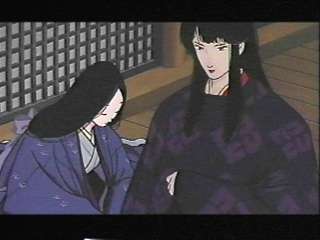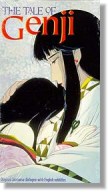![]()

![]()
Genji Monogatari
(The Tale of Genji)
![]()
Copyright: © 1987 Asahi Publishing Co., Asahi National Broadcasting Co. Ltd., Nippon Herald Films Inc. (Japan), © 1995 Central Park Media Corp. (North America)
Distributed by: Asahi Group / Herald Group / TAC (Japan), Central Park Media (North America)
Length: 110 minutes
Genre: historical fiction / drama / romance
Rating: NR, Parental Guidance Suggested
Format: Subtitled (VHS)
Original story by: Shikibu Murasaki Producers: Hara Masato, Tashiro Atsumi Screenplay Written by: Tsutsui Tomomi Character Design: Nakura Yasuhiro Animation Director: Maeda Yasuo Art Director: Magoori Mihoko Music Composition: Hosono Haruomi Director: Sugii Gisaburo Executive Producer of English Version: John O'Donnell English Translation: Studio Phoenix
![]()
Parental Guidance Advised - A historical drama, this is one that would try any child's attention span, as well as several adults. There are the occasional scene or two of nudity and adult situations as well.
![]()

Based on the literary work of Shikibu Murasaki, The Tale of Genji is a story of the Emperor's second son born by a courtier. Made a commoner, he served as a retainer to the court.
![]()
|
Shibiku Murasaki's The Tale of Genji is one of the most significant literary works ever produced -- not only is the book the world's first novel, but the writer also happens to be (partially by default) the world's first female novelist. I have not read the novel (partially because the length of the novel is a bit daunting; I found Victor Hugo's Les Miserables an impossibility), but I have to admit that I had lost some interest after watching this movie. The pace of the film is very calculated, very deliberate, and very slow. This is supposed to be a reflection of the court life during the Heian period, but trying to stay awake for the 110 minutes that this movie demands is, quite frankly, too demanding for the average viewer. There isn't a whole lot of plot. Instead, we have what could very well be a video chronicle, moving from scene to scene (and often jumping ahead in time), very much as if you were turing pages of a diary. The characterisations are impersonal and detached, with very little life evident in any of the characters. I'm not sure if we're supposed to sympathise with Genji Hikaru, but the impression I had when all was said and done is that he was a self-centered, almost childish person more interested in self-indulgence than the people he served. Technically, I found some of the translations odd -- in some cases, the subtitles just didn't seem to properly convey the scene at all. The animation is very minimalistic -- characters are drawn in a fairly severe line-drawing style, and buildings have an almost air-brushed quality to them. Backgrounds and backdrops are almost non-existant; it's very much like a stage play setting where lights are played on the rear scrim at the back of the stage. Several scenes also blend live footage of either buring fire or falling petals; the final scene involves animation very remenicent of Stanley Kubrick's 2001: A Space Oddessy in both pace and composition. By far, it's the pace that's the weakness to this movie. I compare The Tale of Genji with the great Kurowsawa Akira's masterpiece, Ran -- Tale has neither the breadth nor the stunning visuals required to pull it off. A movie for die-hard historians only. - AN This isn't exactly what I'd call an easy piece to critique. I have to admit that I've never read The Tale of Genji before although I have wondered about it several times. Watching this production though was rather interesting, but it's very long and slow paced. Despite it's length, you get the feeling that there's a lot that you're missing out on and I don't doubt that there's a lot of stuff in the original work that was skipped in the animé. The story is basically a chronicle if you will of Genji Hikaru's life; his loves and tragedies while he served at court until his exile. The story is slow moving and deliberate, capturing the feel of the culture of the Heian era and the life at court; music and poetry are prominent throughout the movie as well as some dance. The animation itself is nice yet simple. There is not a lot of detail put into the backgrounds but the people themselves are beautifully drawn. I sometimes found it difficult to distinguish between some of the incidental characters that were encountered let alone who they were. A definite drawback since it almost seems like there was an assumption that you will have some knowledge of the original work in order to fully understand what's happening in the movie. As it was, I found that I missed the passage of time in the movie and found things a bit confusing. However, the various time marks (eg. birth of the Crown Prince) helped sort out just what sort of time frame the story takes place; years, not months. The music, while nothing fantastic, is still captivating in its own way; it's quite simple yet haunting. While you don't need to have read the literary work, I get the feeling that it would help if only in understanding who some of these people were, how they were related and what role they played in the story. Still, more than anything, The Tale of Genji captures the feel of the culture. One thing which I found noteworthy was the translations. For such a historic work, let alone a tale involving the nobility, I really think they should have used appropriate language in the translations. While it wouldn't be as easy to read, it seemed odd to hear more formal Japanese while seeing everyday English in the translation. There are also some odd bits of sub-titled dialogue where it seems that they did literal translations not taking into account cultural nuances. Much like translating onisan as "brother" in the dialogue rather than using the person's name. The translation's not wrong, just awkward. All in all, this was a beautiful animé production to watch, but at the same time extremely long and slow (and deliberate) in its progression. A good watch/rent for when you're in the mood for something historic or cultural. - JYN |
![]()
| Original: | Subbed: | Dubbed: | |
|---|---|---|---|
| Story: | N/A | N/A | |
| Direction: | N/A | N/A | |
| Acting: | N/A | N/A | |
| Animation: | N/A | N/A | |
| Music: | N/A | N/A | |
| Translation: | N/A | N/A | |
| Overall Rating: | N/A | N/A |
[ home ]
[ what's new ]
[ café contest ]
[ café reviews ]
[ parent's guide ]
[ encyclopædia ]
[ café trivia ]
[ café latté ]
[ café espresso ]
[ about the café ]
[ feedback ]
[ links ]
[ site map ]
© 1997-2000. All rights reserved. The Animé Café logo and the Crystal Kyoko award are original creations of the Animé Café. Please do not use any of the materials on this site without the expressed written permission of the Animé Café.
Page last modified 1999.01.26
